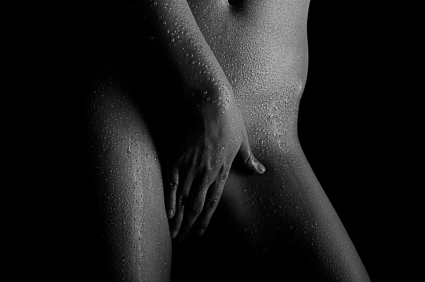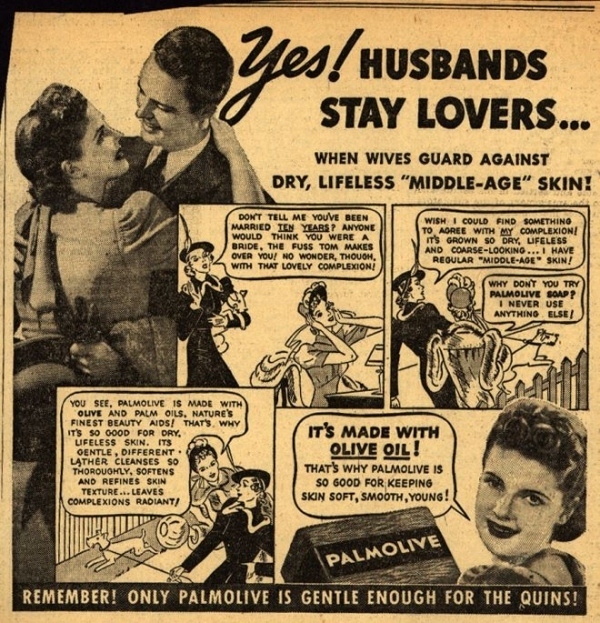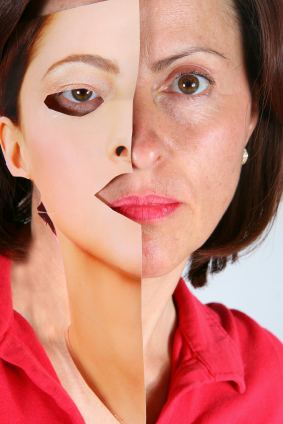Wednesday Bubble: Fifty is the new…
Bet you were going to say 30, right? Or 25?!
According to a recently published paper in the journal Advances in Life Course Research, the definition of midlife (and 50) isn’t as cut and dry as you may have thought. However, the findings likely won’t surprise you; gender plays a huge role in perception. And women? They don’t like to believe that they’ve reached the milestone…yet.
The researchers, who harken from Florida State University’s Pepper Institute on Aging say that most ‘life course’ studies pay little attention to subjective factors that affect our perceptions, such as how young or how old we feel, financial stability or health. So, they looked at longitudinal data that was compiled during two time periods: 1995-1996 and 2004-2006 and evaluated it on the basis of age in years (aka chronological age), gender, race, socioeconomic status and age identity (how old or young survey participants felt). Then they took a deeper dive and analyzed education levels, income, physical and mental health, and marriage status and parenthood status (biological or adopted children and adult children status).
The findings are pretty interesting:
- Our conception of the timing of life change with age and shift as our lives and our perceptions shifts. BUT…women and older individuals tend to elongate life and postpone the middle age time marker.
- Men believe that midlife starts as much as three years earlier for women; this is consistent with the societal perception that when it comes to aging there is a double standard. Women, on the other hand, tend to postpone their idealization of middle age — at least for their female peers — as long as two years.
- If you feel old, you tend to believe that life is shorter (and that middle age occurs earlier). And if you are young? Middle age starts a heck of a lot earlier than older adults believe it does.
- Finances and poverty tends to shorten life. And shorten life perceptions.
- If you are in poor health, began your family at a very young age, are divorced or living without parents? You are likelier than individuals who don’t fit into these categories to think of your life as shorter. And as middle age occurring a hell of a lot earlier.
It all sounds very clinical, doesn’t it? But the key take away is that life is not necessarily a straight and narrow path. And more importantly? As women, we are often viewed as middle aged perhaps before we are prepared to view ourselves there. Mostly? If you/we feel young, more power to you/us. Those life bookends all depend on you. Associate Professor Anne Barrett and a key researcher in this study believes that the majority of people believe that middle age begins at 44 and ends at 60.
It’s what you make it. And to heck with that individual next to you who is believes that fifty is not the new…[fill in the blank]. But truly? Fifty is the new fifty. And what you make of it. I’m about to turn 51 in less than a week. Look out world; I am really only me and that me feels pretty darn young on some days.
Read More
Tears dry? Dry mouth? Chapped lips? Must be the ‘pause
A friend recently asked if I had run across any research papers linking chapped lips to menopause. Although I’ve not seen that direct association, I can tell you menopause is linked with dry mouth as well as burning mouth syndrome, i.e. burning in the tongue or oral mucous membranes and taste alterations.
In so far as dry mouth and burning mouth syndrome go, the tissues in the mouth and the salivary glands both contain estrogen receptors. Consequently, hormone fluctuations, like those associated with menopause, can affect the mouth, lips, tongue and even lead to periodontal disease. The rub is that although researchers are aware of this, the data are pretty scarce, although studies have shown that saliva, which by the way, is the primary defense against oral disease, is more productive in premenopausal compared to postmenopausal women. Moreover, it appears that psychological stress can also influence saliva flow, since it affects the nervous system. In some ways, it’s similar to an endless loop: oral discomfort relating to dry or burning mouth can lead to unpleasant sensations and anxiety, which then activates the autonomic nervous system and further reduces saliva.
Although there is not cure for either issue, there have been small but inconclusive studies indicating that hormone replacement may help. Dry mouth can be counterbalanced by drinking at least 1 to 1.5 liters of water or other liquid daily, or using commercial mouthwashes especially formulated for dry mouth. For burning mouth syndrome, there are commercially available gels and ointments, and some practitioners recommend rubbing olive or other vegetable oil to the oral tissues. Short of that, severe cases may benefit from antidepressants or probiotic products. For chapped lips? Personally, I am pretty hooked on the Pangea Organics line of lips products but I recommend that you use what feels best. Finally? Be sure to maintain your oral health by seeing the dentist regularly. It’s essential!
Read More
Wednesday Bubble: Designer What?!
 Rarely do I run across editorials in medical journals that catch my attention at the first sentence. However, this one wins my vote, not only for its candor but also for its attempt to clear the air, so to speak about ‘designer vaginas.’
Rarely do I run across editorials in medical journals that catch my attention at the first sentence. However, this one wins my vote, not only for its candor but also for its attempt to clear the air, so to speak about ‘designer vaginas.’
Designer what?
You may recall that I ran a piece in early February about vaginal rejuvenation and the promise the procedure offers to millions of women who are concerned about their aging va-jay-jays.
Hold on for one sec! You may want to reconsider getting a facelift ‘down there.’ At least according to two physicians from Yale.
Burstable? You bet!
Drs. Alexandra Pencow and Marsha Guess from Yale University School of Medicine say that the purported benefits of female genital cosmetic surgery (FGCS), namely that there is a “normal or standard in vaginal aesthetics,” or that FGCS will “result in improved sexual function” are misleading. They write (in the April issue of the journal Maturitas):
“The ‘designer vagina’ sounds like the name of a ‘Sex in the City’ episode, and may evoke a variety of responses, from enthusiasm for anything that can make the vagina more modern and user-friendly, to mistrust for unproven treatments for conditions that have not been clearly defined.”
FGCS refers to surgical procedures that modify the shape, caliber or length of the vagina and external genitals for aesthetic purposes. They include:
- Labiaplasty, to reduce labial size or corrects irregularities (if the labia are too large, elongated or assymetrical)
- Vaginoplasty or vaginal rejuvenation, to narrowsthe vagina and the vaginal entrance
- Clitoral unhooding, geared towards removing the tissue surrounding the clitoris to enhance sexual and genital sensation
- Hymenoplasty, a form of ‘revagnation,’ in which the hymen is reconstructed to mimic virginity
- G-spot amplification, i.e. injecting collagen into the vaginal wall to increase sexual satisfaction/sensitivity
The physicians write that despite the lack of clinical evidence proving benefit, these procedures have increased three-fold or more in both the U.S. and the United Kingdom. They also note that the media, talk shows, women’s magazines and the Internet combined have worked to perpetuate myths about these procedures without properly explaining the reasons why they might be done other than aesthetics. Procedures such as the ones described above can be invaluable following cancer, trauma or pelvic organ prolapse to improve life quality and treat certain symptoms.
Still, when it comes to aesthetics, there is a lack of standards for these procedures to define proper follow up and outcomes. Even more important is the fact that there is no true definition of “normal.” How then does a woman who desires smaller labia or an enhanced vagina temper her expectations?
Sexuality, sexual desire and sexual satisfaction are multifacted and personal, influenced by life stressors, environment, mood, self-esteem, hormones, personality and social and partner support. The new ‘normal’ isn’t supposed to be defined by the medical community and the media, is it? Just as the Menopause Industrial Complex wants to sell you on HRT, so apparently do the Vaginal Patrol wish to convince you that your parts ‘down under’ need a nip, tuck, an ‘Occupy,’ if you will.
Designer vaginas? Evidently, they’re here to stay. The benefits, however? Hard to say.
Read MoreWednesday Bubble: Say what you will, but the way to a man’s heart is through your hands
Bet you thought I was gonna talk about something else, didn’t you?
Nope, it’s all about anti-aging, 1940s style. Funny thing is that nothing has really changed. Well, almost nothing.
Middle aged skin in the 40s is the same as middle aged skin in the ‘2012’s…except the solution.
Happy Wednesday!
Read More
Wednesday Bubble: Want to look years younger? Consider the knife
This headline, which appeared in the LA Times on February 20, says it all:
Plastic surgery does make you look younger, study finds.
Earth shattering, right?
Actually, what struck me most about it is that on a day when scientists were reporting that the reasons that certain conditions associated with aging may be due to changes in the eye (e.g. narrowing of the lens and pupils) responsible for controlling our internal clocks, that headlines touting more nip and tuck were stealing the show.
Not too long ago, I wrote about a survey that was conducted in England that showed that a third of women would give up a year of their lives, forgo part of their salary or a promotion or sacrifice time with their partners to achieve an ideal body weight and appearance. Shortly thereafter, I featured an incredible piece by author D.F. Wolf about ‘anti-aging,’ in which she questions the need to appear young and literally erase our appearance. And right after that, we learned that ‘make-up makes the woman.’
What a perfect trifecta of misconstrued values about our worth as women.
That’s why this particular study is drawing a few questions in my mind. Published online in the Archives of Facial Plastic Surgery, it reviews an investigation of 60 patients (of whom 54 were women) between the ages of 45 and 72 who had undergone three different combinations of plastic surgery:
- face and neck-lift
- face and neck-lift, and removal of bags and sagging around the eyes/eyelids
- face and neck-lift, removal of bags/sagging around the eyes/eyelids and a forehead lift
The goal of the study? To prove that facial surgery not only makes you look better but definitively alters how others perceive you. To achieve this, they asked first-year medical students to view the before and after photos of the patients and then estimate their age. The researchers found that prior to surgery, the students estimated that on average, patients were 1.7 years younger than their actual chronological age, and after surgery, 8 years younger. By group, the raters perceived patients who had had the most facial surgery as the youngest.
The researchers claim that this study was conducted in order to provide a means by which facial surgery can be quantified However, what it doesn’t address is the degree to which attitude, self-awareness and a general sense of wellbeing also influence how we look and how others perceive us. Moreover, while surgeons now have “the ability to resuspend, excise, tuck, inject and augment, the question remains: ” how do you achieve a ‘look’ without robbing that person of their unique attributes or characteristics?
We live in a society where aging is a four letter word and fountain of youth is an abused. elusive goal, where teenagers often model in lieu of actual adults and where photoshop and air brushing is the rule and the exception. The message inherent in this study and in the headlines that appeared on the web that day is that more plastic surgery= more pleasure. However, how many of you recall news of Madonna’s new, new face or Jocelyn Wildenstein’s frightening New York Magazine cover photo in 1997? When does ‘more’ become ‘too much?’
Admittedly, there are days I look in the mirror and am shocked by the reflection staring back at me. And days I’d consider a nip and a tuck. But to what end? Am I trying to achieve a youthful glow or a bonefide bonfire of juvescence?
Maybe it’s time to step back, really step back, and consider the message that we are sending to ourselves and to the girls and young women in our lives. Don’t we owe it to us..and to them?
Read More








